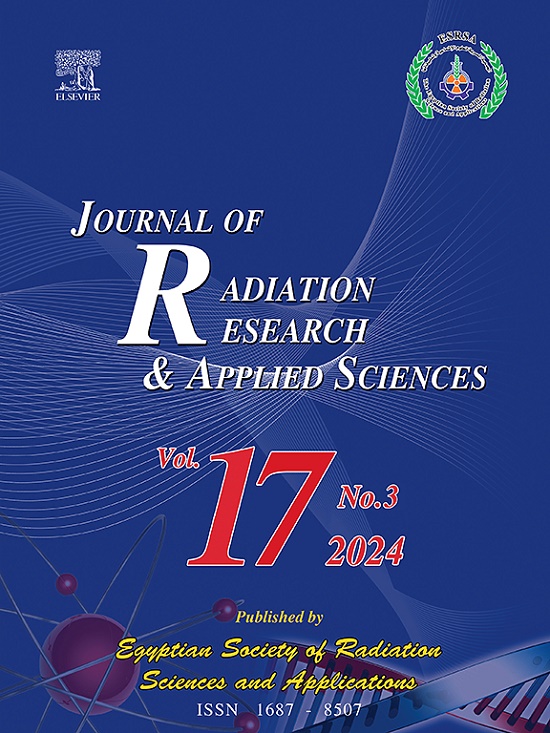Efficient energy utilization in LTE networks with intelligent handover mechanisms
IF 1.7
4区 综合性期刊
Q2 MULTIDISCIPLINARY SCIENCES
Journal of Radiation Research and Applied Sciences
Pub Date : 2025-05-10
DOI:10.1016/j.jrras.2025.101599
引用次数: 0
Abstract
As mobile data traffic surges and the number of connected devices rises, energy efficiency has become a critical concern in Long-Term Evolution (LTE) networks. Traditional handover algorithms in LTE systems prioritize metrics such as signal strength and load balancing, often overlooking the impact on energy consumption. This study addresses that gap by proposing an intelligent, data-driven handover optimization framework designed to reduce energy usage in heterogeneous LTE environments. The core objective is to enhance network sustainability without significantly compromising Quality of Service (QoS). To achieve this, we introduce a machine learning-based handover decision mechanism that integrates user behavior prediction and workload balancing. Thus, analyzing both user mobility patterns and network conditions, the proposed system identifies optimal timing and target cells for handovers. This proactive strategy minimizes unnecessary signaling and handover attempts, which are common sources of energy waste in traditional approaches. The framework includes a Mobility Load Balancing (MLB) algorithm that extends beyond conventional metrics, incorporating energy-awareness as a key factor in decision-making. Simulations demonstrate that our intelligent handover mechanism delivers substantial energy savings while maintaining service quality at acceptable levels. Specifically, it outperforms standard LTE handover methods by significantly reducing redundant handovers and base station power usage. This research not only contributes to the theoretical understanding of energy-efficient radio network (RN) management but also provides a practical solution for telecom operators aiming to deploy greener LTE infrastructures. Also, leveraging machine learning techniques, the proposed model supports more sustainable operations and helps networks better manage the increasing data demands of the Internet of Things (IoT) era. In summary, our work introduces a novel, intelligent approach to LTE handover management that aligns energy efficiency with service performance. The findings suggest that intelligent, predictive algorithms can play a pivotal role in creating more sustainable and cost-effective wireless networks.
基于智能切换机制的LTE网络的高效能源利用
随着移动数据流量的激增和连接设备数量的增加,能源效率已成为长期演进(LTE)网络的一个关键问题。LTE系统中的传统切换算法优先考虑信号强度和负载平衡等指标,通常忽略了对能耗的影响。本研究通过提出一种智能的、数据驱动的切换优化框架来解决这一差距,该框架旨在减少异构LTE环境中的能源使用。核心目标是在不显著影响服务质量(QoS)的情况下增强网络的可持续性。为了实现这一点,我们引入了一种基于机器学习的切换决策机制,该机制集成了用户行为预测和工作负载平衡。因此,通过分析用户移动性模式和网络条件,所提出的系统确定了用于移交的最佳时机和目标小区。这种主动策略最大限度地减少了不必要的信令和切换尝试,这是传统方法中常见的能源浪费来源。该框架包括一个超越传统指标的移动性负载平衡(MLB)算法,将能源意识作为决策的关键因素。模拟结果显示,我们的智能交接机制在保证服务质量达到可接受水平的同时,节省了大量能源。具体来说,它通过显著减少冗余切换和基站功耗,优于标准的LTE切换方法。本研究不仅有助于对节能无线网络(RN)管理的理论理解,而且为旨在部署更绿色的LTE基础设施的电信运营商提供了实用的解决方案。此外,利用机器学习技术,所提出的模型支持更可持续的运营,并帮助网络更好地管理物联网(IoT)时代不断增长的数据需求。总之,我们的工作为LTE切换管理引入了一种新颖的智能方法,使能源效率与服务性能保持一致。研究结果表明,智能预测算法可以在创建更具可持续性和成本效益的无线网络方面发挥关键作用。
本文章由计算机程序翻译,如有差异,请以英文原文为准。
求助全文
约1分钟内获得全文
求助全文
来源期刊

Journal of Radiation Research and Applied Sciences
MULTIDISCIPLINARY SCIENCES-
自引率
5.90%
发文量
130
审稿时长
16 weeks
期刊介绍:
Journal of Radiation Research and Applied Sciences provides a high quality medium for the publication of substantial, original and scientific and technological papers on the development and applications of nuclear, radiation and isotopes in biology, medicine, drugs, biochemistry, microbiology, agriculture, entomology, food technology, chemistry, physics, solid states, engineering, environmental and applied sciences.
 求助内容:
求助内容: 应助结果提醒方式:
应助结果提醒方式:


